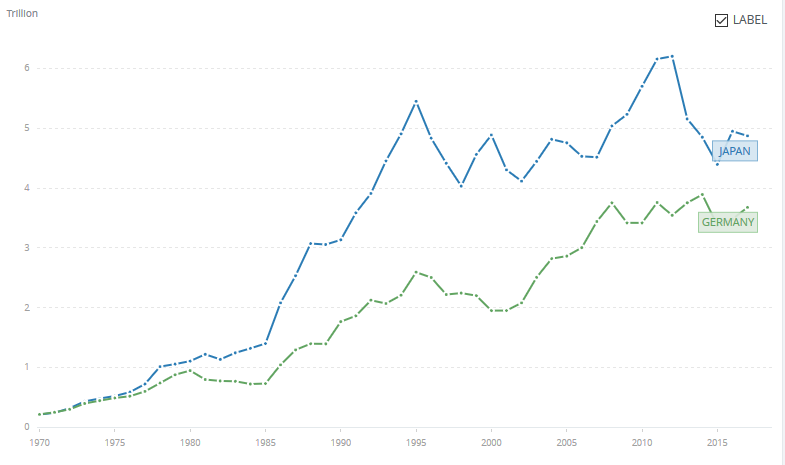Comparing Japan and Germany is an interesting exercise….as they kind of started at the same point. Their leaders in World War II were disgraceful incompetents who got their nations into wars they could not win, leading to them being bombed into oblivion and then occupied. They both started at the same point for recovery. In 1970 Japan had a GDP of 212.609 billion while Germany had a GDP of 215.022 billion. They oddly enough, almost ended up at at the same point, for in 2017 Japan had a GDP of 4.872 trillion while Germany had a GDP of 3.677 trillion. Considering that in 2017 the Japanese population is 127 million, and the German population is 82 million, at this stage Germany actually had the higher per capita income, being $44,550 compared to $38,440 (or $50,206 compared to $42,659 using PPP – Purchasing Power Parity, IMF 2017 figures). On the other hand, their trips to these points are very different as shown in this graph, showing their GDP from 1970-2017:

From 1970 through 1977 their economic growth almost parrelled each other. After that Japan’s economy started growing faster, then it boomed and after 1995 it busted. The German economy also declined after 1995, but since then seems to have grown and then stabilized.
While both nations have a fertility rate well below 2.1 (which is the replacement rate) they have reacted differently to immigration. Germany has been far more accepting of immigration than Japan. The end result is that Germany’s population is projected to still be at around 79 million in 2050 while Japan is expected to decline to 109 million. I am probably on safe ground to state that in the long run, Germany will have a higher GDP than Japan, meaning it will probably rise to be the third largest economy in the world.

Well, Japan was a developing country during WW2 (USSBS) and grew exponentially after receiving access to the global market, while Germany destroyed itself in two world wars, as it was the 2nd largest economy in the early 20th century (60% of US GDP, 1913 market rates, Japan was 10). It was effectively divided till the 90s, Japan had the “privilege” to be occupied by the US. From an economic perspective a contrast to the fruitless influence of communist regimes.
Re:Immigration
Japan’s heavily invested in AI and robotics to the point that these are being used in more functions of economic life. I rather think Japan will surprise us still.